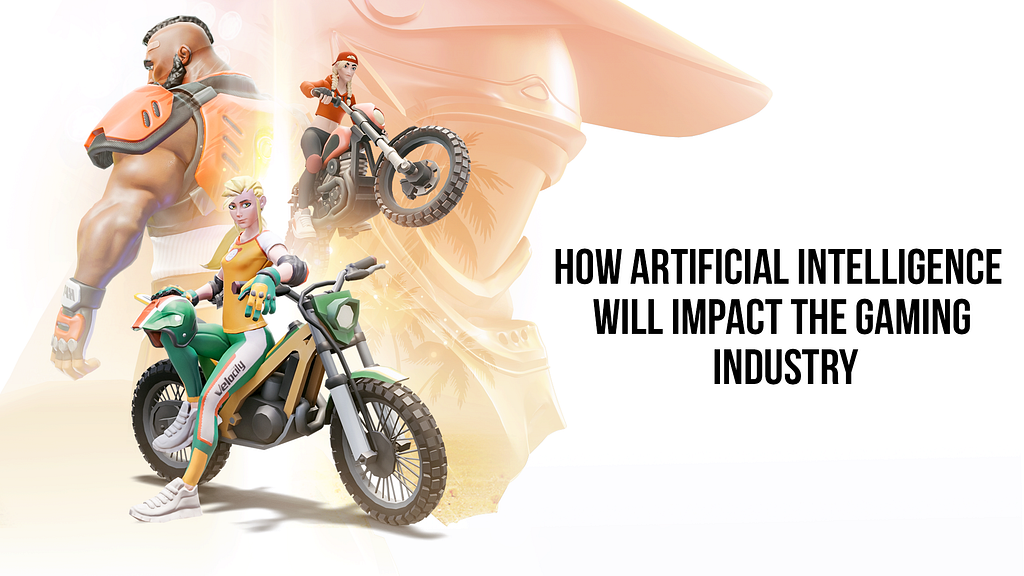How artificial intelligence will impact the gaming industry

In the past couple of years, we’ve seen the rise of artificial intelligence become more present than ever before. Whereas the use of algorithms have been a driver for the growth of social media applications, but also made matchmaking systems in gaming possible, it has never been as visible as today. With DALL-E and ChatGPT widely available it makes us wonder, how will artificial intelligence impact the gaming industry in the near future?
The history of artificial intelligence in gaming
Back in the days, things were simple; you have a couple of dice in your hand or a deck of cards, and there’s your game. With the entrance of computers, and especially the internet, a whole new realm of possibilities came to the surface. This includes experimental technology like artificial intelligence, thas has been present in the gaming industry for the past couple of years.
Whereas some ways artificial intelligence has been implemented are more visible than others, its presence is undeniable. One of these examples is the creation of an improvement of intelligent NPCs (non-player characters) that players can interact with in a natural and realistic fashion. Also, new forms of player interaction, such as voice and facial recognition, have become available because of artificial intelligence.
Other implementations are more geared towards the development of the games where developers can enjoy the automation of tedious tasks, and unlock new possibilities. A few examples are the automation of pathfinding, object placement, analysis of player actions and data, and the generation of new environments.
In most cases, artificial intelligence has been implemented to improve the realism and the immersion of the game, and thereby improving the player experience.
The new wave

With a combination of both a growing gaming industry, and a growing number of people working on the growth of artificial intelligence, there’s another digital revolution awaiting us. To showcase the potential, let’s have a look at some examples of implementations of artificial intelligence, and even how it’s impacting gaming today;
- GPT-3 (Generative Pretrained Transformer 3) — a large language model trained by OpenAI that can generate human-like text and perform a variety of language tasks, such as translation and summarization.
- Google’s Duplex — an AI system that can make phone calls and carry out natural conversations with humans.
- OpenAI’s Dactyl — an AI system that can manipulate objects in a virtual environment using a robotic hand.
Then, there are several robots created by DeepMind and OpenAI that are able to learn a game and play at a professional level. This has first been tried with chess, where the AI is already beating the most prolific players, and then advanced to more complex games like StarCraft II and Dota 2. But, how will the Esports industry evolve, if AI has the ability to beat every single human player?
Immersive and more realistic
Whether we will live in a dystopian world where everyone wakes up in their pod to enter a virtual world, and spend most of their days there, or an alternative to the current gaming industry remains unclear until the moment is there. Speculations are going in all directions, and sci-fi novels portray dozens of interpretations of what AI could bring us.
However, given what we have learned about the use cases of artificial intelligence in gaming nowadays, certain implementations can be expected to continue their presence.
Enhancing the experience

Embracing the dystopian future, artificial intelligence will continue to assist game developers in their quest to make their games as realistic as possible. First off, this will be by making the in-game worlds more realistic and adapting to the players’ input. Next up, is the introduction of virtual reality, and the way these environments look these days.
Where developers need to map out every inch of the environment right now, artificial intelligence can assist in building on top of what the developers have created. This will allow players to truly feel like they are a part of the game world, including AI-powered NPCs that players can interact with in unique ways. The responses of these in-game characters will no longer be limited to the pre-written input by the developers, but will respond to the players’ actions and provide a unique response to each player.
Unique adventures
Elaborating on the above, artificial intelligence allows players to have a unique experience when they play the same game as others. Imagine starting a game that adapts and evolves in real-time with the help of machine learning algorithms. Think of dynamically generated levels, enemies or even entire worlds that are generated based on the choices of a player.
This will not only make the game a unique experience for the player, but simultaneously for its developers. The development will stop at a certain point, but will never be done. The models will continue to learn, and generate new worlds that the developers might never have imagined. In a sense, embracing artificial intelligence is like hiring several game studios to continue to build your game.
Reaching extreme heights

With Trial Xtreme, we have been embracing any technological innovation out there ever since we started out building games. This open stance allowed us to quickly adapt and always bring out the best for our players. These days, we’re doing so with blockchain technology in various shapes and forms, but we’re always curious how the future will evolve.
Artificial intelligence has helped us before with generating matchmaking scripts and other implementations, but we’re always excited to experiment with new use cases. Are you one of the bright minds with a passion for gaming, technology and high-traffic platforms? Reach out and join the revolution!
To stay up to date with our journey, follow us on these channels:
Twitter: https://twitter.com/TrialXtreme
Medium: https://medium.com/@gameplaygalaxy
Discord: discord.gg/trialxtreme
Website: https://gameplaygalaxy.com/

